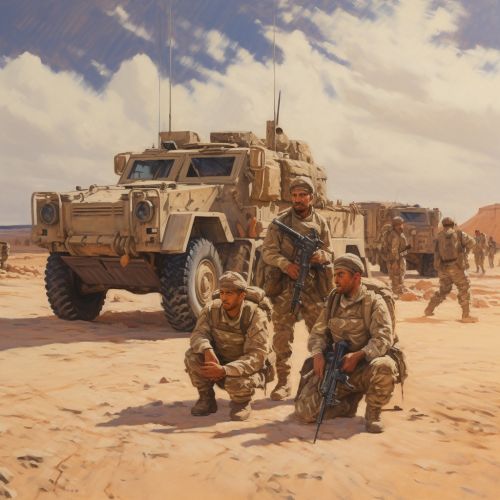Iraq War
Background
The Iraq War was a protracted armed conflict that began in 2003 with the invasion of Iraq by a United States-led coalition that overthrew the government of Saddam Hussein. The conflict continued for much of the next decade as an insurgency emerged to oppose the occupying forces and the post-invasion Iraqi government. An estimated 151,000 to 600,000 Iraqis were killed in the first three to four years of conflict. US troops were officially withdrawn in 2011. The U.S. became re-involved in 2014 at the head of a new coalition; the insurgency and many dimensions of the civil armed conflict continue. The invasion occurred as part of the George W. Bush administration's War on Terror following the September 11 attacks despite no connection of the latter to Iraq.


Causes of the War
The causes of the Iraq War are subject to controversy and debate. The Bush administration asserted that the Saddam Hussein regime possessed weapons of mass destruction (WMDs), which threatened international peace and security. In his State of the Union address in January 2003, President Bush stated that "The British government has learned that Saddam Hussein recently sought significant quantities of uranium from Africa." This claim was based on forged documents, known as the Niger uranium forgeries, and was later retracted by the administration.
Invasion
The invasion of Iraq by the US-led coalition commenced on March 20, 2003. The invasion force was led by the United States, with the support of the United Kingdom, Australia, and Poland. The invasion marked the start of the Iraq War. The stated reason for the invasion was "to disarm Iraq of weapons of mass destruction, to end Saddam Hussein's support for terrorism, and to free the Iraqi people."
Post-Invasion Insurgency
Following the invasion, an insurgency quickly began against the coalition forces and the newly established Iraqi government. The insurgency was composed of a diverse mix of militias, foreign fighters, all-Iraqi units, and others. The insurgency included the Al-Qaeda in Iraq, which became a major force in the insurgency.
Coalition Withdrawal and Subsequent Developments
The US officially completed its withdrawal of troops in December 2011, ending the Iraq War. However, sectarian violence continued and reached a peak in 2014, leading to the rise of the Islamic State of Iraq and the Levant (ISIL), also known as ISIS. In response, the US led a new coalition to counter ISIS in Operation Inherent Resolve.
Impact and Legacy
The Iraq War has had far-reaching impacts on the Middle East and the world. The war and its aftermath have been subject to widespread criticism, and the removal of Saddam Hussein's government led to a power vacuum and instability in Iraq, which contributed to the rise of ISIS. The war has also led to a refugee crisis, with millions of Iraqis displaced.
